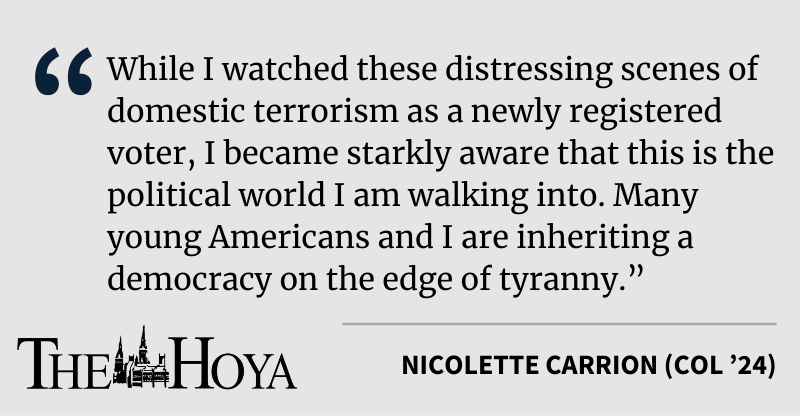Like many Americans on Jan. 6, I watched our government fall under siege: Members of Congress sheltered in place as rioters scaled the Capitol. Once inside, the trespassers shattered windows, broke down doors and trespassed in elected officials’ offices and both chambers of Congress, prepared with weapons, zip ties, nooses and Confederate flags. This day was one of the lowest points in U.S. history, and it was surreal to witness such an invasion.
While I watched these distressing scenes of domestic terrorism as a newly registered voter, I became starkly aware that this is the political world I am walking into. Many young Americans and I are inheriting a democracy on the edge of tyranny.
It is a democracy shaken by the voices of ignorant, self-serving and careless leaders who have stirred insurrection and perpetuated the ongoing COVID-19 pandemic with anti-science rhetoric. It is a democracy weakened by assaults on our rights and liberties, such as in Texas, California and Georgia, where officials interfered with polling locations and ballot boxes to disenfranchise voters, and in Washington, D.C., where police used rubber bullets to strike peaceful Black Lives Matter protesters for a presidential photo-op. It is a democracy weakened by assaults on common and dignified practices, including the certification process of the next president, weakened by assaults on respected offices like a Supreme Court justice confirmed along partisan lines amid an election season or by the president’s pardoning of political cronies, such as his former campaign manager, Paul Manafort. Lastly, we inherit a democracy plagued by misinformation, opportunism and the delegitimization of the truth, with unrelenting attacks on free press, false claims about COVID-19 and the presidential election’s validity and the vast expansion of conspiracy theories like the QAnon cult.
This reality is our first experience with “democracy.”
Young Americans are questioning whether this behavior is normal — if an insurrection is supposed to happen amid the transfer of power, if our leaders will always fail us during crisis because of their incompetence and self-interest, if there will ever be accountability for political corruption and attacks on our democratic system, or if our nation will ever realize justice for all, given the contradiction of mostly peaceful Black Lives Matter protesters being met with heavy military police presence while predominantly white, pro-Trump crowds invading the Capitol faced minimal police rebuke.
I am deeply troubled by the blatant privilege these trespassers demonstrated, as well as the lack of accountability for the more than 20,000 demonstrably false claims Trump has made in the past four years.
As children, we were taught to treat others with dignity, to respect rules and expect accountability, to be loving toward one another, and to be selfless, because it grants rewards. Even in the Georgetown University community, we are encouraged to strengthen these values through our Jesuit heritage. The actions of our current leadership, however, challenge every facet of those teachings. What does this undoing mean for our future? Are these values futile? How can we be different from our predecessors? How did they get lost along the way?
These doubts and frustrations about our democracy and basic character call into question the nation’s ultimate direction: will we continue down our anti-democratic path, detached from facts and reality, emboldening hate and ignorance? Or will we pursue our highest ideals of equal rights, justice and opportunity for all, not just a select group?
Few generations have had to face a reality so daunting at such a young age, yet we have been dropped squarely into the debate regarding the fundamental question of what the future holds. The world our current leaders leave behind is the world we will be responsible for shaping. If they fail to resolve current frustrations, our generation will be left with the tremendous burden of strengthening our democractic systems, checks on power, racial equality and unity as a nation.
If there is any lesson from elected officials implicated in the insurrection that Georgetown students and young people in general can learn as future leaders, it is that we do not get to decide which actions and words carry weight. To paraphrase President Biden, words can inspire and incite because everything we do begets some level of consequence. History and future generations will be watching us, and the greatest consequence will be our legacy. So let us remember the truth is powerful and lies are dangerous. Our instinct to reason must outweigh our compulsion to act on our impulses, and diverse perspectives can bridge our greatest divides.
As we look out for the future, the uncertainty of the present remains. We are grappling with a pandemic, a struggling economy, a racial reckoning and now an extreme right-wing insurrection. Whether we meet the challenges of the times will be the American people’s decision.
While our immediate path forward is largely unknown, I know this much is true: I want to believe in hope again; we all want to believe in hope again. But we must believe in each other first. We must see each other once again and redouble the values and teachings of cura personalis to reconcile that we can be different and alike, fearful and optimistic, flawed and extraordinary. Our intersectionality binds us together and makes us whole. So while we enter another atypical semester, I implore readers to build strong and loving communities of diversity — of thought, of background and of experience — to finally see the kinship harbored inherently within us.
Nicolette Carrion is a first-year in the College.









